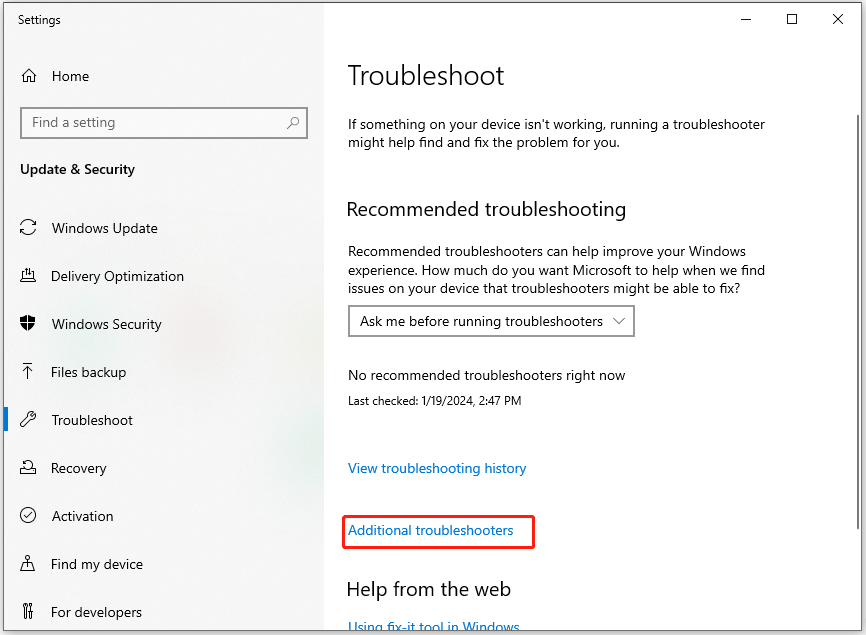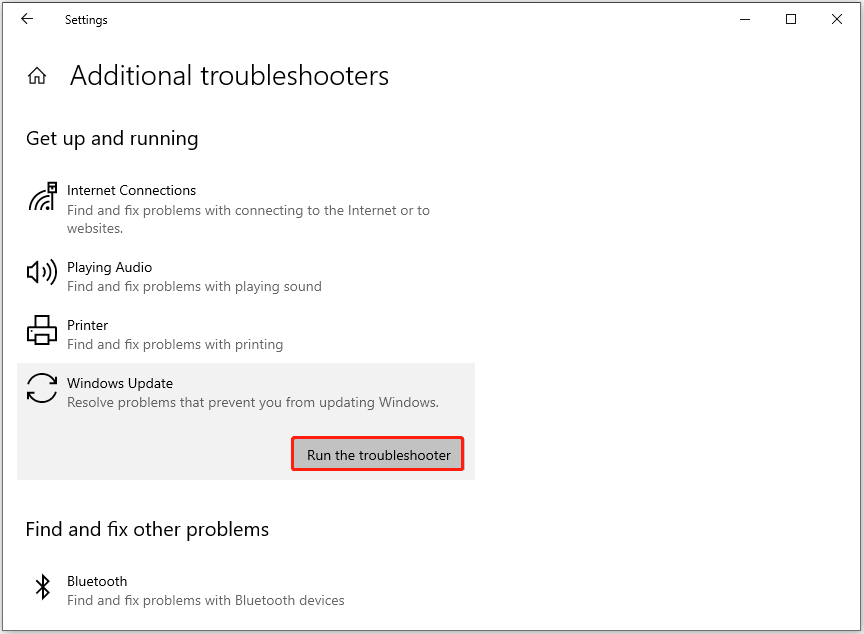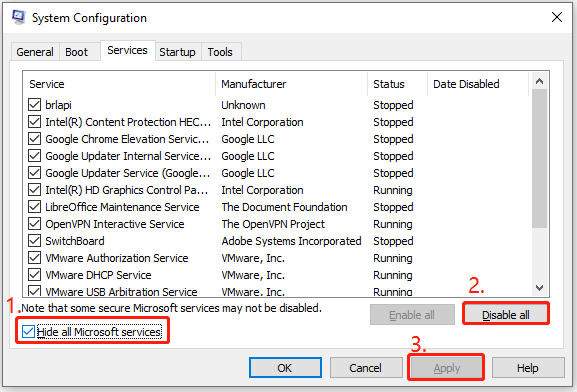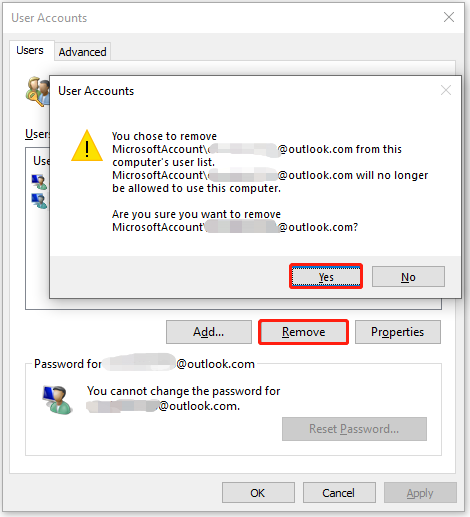Recently, some users have reported encountering the error code 0x80070004 – 0x2000D during Windows OS upgrades. This error occurs in the migration phase and is very frustrating and time-consuming. Are you also encountering the same error? If so, continue reading to get the reasons and some solutions.
Causes of Windows Upgrade Error 0x80070004 – 0x2000D
What causes the Windows upgrade error 0x80070004 – 0x2000D? The error can mainly be caused by a corrupted or misconfigured user profile, or leftover system files from previous failed installations can interfere.
Additionally, third-party software, external devices, hidden files, or permission issues may also be related to the error. Now, let’s try the following methods to troubleshoot the error.
MiniTool Partition Wizard FreeClick to Download100%Clean & Safe
Method 1. Disconnect External Devices
External devices that are connected to your computer may interfere with the installation process and cause the Windows upgrade error 0x80070004 – 0x2000D easily. In this case, you can try disconnecting all unnecessary USB devices and peripherals from your PC, and then restarting your PC to check if the error has been resolved.
Method 2. Run Windows Update Troubleshooter
You can also run the Windows update troubleshooter to find and fix Windows upgrade error 0x80070004 – 0x2000D. Here’s the way:
Step 1. Press the Win + S keys at the same time to open the Search window.
Step 2. Type “troubleshoot” in the search box, and press Enter to open the Troubleshoot Settings window. Then, click Additional troubleshooter from the right panel.

Step 4. Next, choose Windows Update and click Run the Troubleshooter.

Step 5. Once done, follow the on-screen guide to fix the found issue. After that, restart your computer and check if the error is fixed.
Method 3. Reset Windows Update Components
Windows Update components are responsible for managing the download and installation of updates on Windows. If there are issues with them, you can run into Windows upgrade error 0x80070004 – 0x2000D easily.
So, you can try resetting the Windows Update components to resolve the issue. Here’s how to do that:
Step 1. Press the Windows key, and type “cmd” in the box. Then, right-click Command Prompt and select Run as administrator.
Step 2. In the elevated Command Prompt window, execute the following commands:
- net stop wuauserv
- net stop cryptSvc
- net stop bits
- net stop msiserver
Step 3. After that, the Windows Update-related services are stopped. Next, type the following commands to rename the SoftwareDistribution and Catroot2 folders:
- ren C:\Windows\SoftwareDistribution SoftwareDistribution.old
- ren C:\Windows\System32\catroot2 Catroot2.old
Step 4. Once done, run the following commands to restart the Windows Update-related service:
- net start wuauserv
- net start cryptSvc
- net start bits
- net start msiserver
Step 5. Now, reboot your computer and check if the error code 0x80070004 – 0x2000D is solved.
Method 4. Perform a Clean Boot
If you suspect that error code 0x80070004 – 0x2000D on your PC is caused by third-party software interference, you can perform a clean boot to upgrade your Windows. Here’s how to do that:
Step 1. Press the Win + X keys simultaneously and select Run to open the Run window.
Step 2. Type “msconfig” in the box and click the OK button to open the System Configuration window.
Step 3. Select the Services tab and check the Hide all Microsoft services option. Then, click the Disable all button and then click the Apply button.

Step 4. Next, go to the Startup tab, click Open Task Manager, disable all startup items, and close the Task Manager.
Step 5. Go to the Boot tab and mark the Safe boot option.
Step 6. After that, click OK and restart the computer to try upgrading your Windows again.
Method 5. Run SFC and DISM
System File Checker (SFC) and Deployment Image Servicing and Management (DISM.exe) can both check and fix corrupted system files.
So, if you suspect the Windows upgrade error 0x80070004 – 0x2000D is caused by corrupted system files, you can try performing SFC and DISM to fix the error. To do that, you just need to run Command Prompt as administrator and execute the following commands to run SFC and DISM:
- sfc /scannow
- DISM.exe /Online /Cleanup-image /Scanhealth
- DISM.exe /Online /Cleanup-image /Checkhealth
- DISM.exe /Online /Cleanup-image /Restorehealth
Method 6. Clean up Leftover Installation Files
The leftover installation files of previous failed upgrades can cause conflicts with the new upgrade process. Therefore, you can try removing them to give the new upgrade a clean slate. Here’s the guide:
- Open the Run window.
- Type “%windir%\SoftwareDistribution\Download” in the box and press Enter.
- Press Ctrl + A keys simultaneously to select all contents in this folder.
- Then, click Delete under the Home tab.
- Next, go to C:\WINDOWS.~BT and delete that folder if it exists.
- After that, reboot your PC and try upgrading again to check if the error is fixed.
Method 7. Remove Unnecessary User Profiles
Sometimes, old or unused accounts may contain corrupted files that interfere with the upgrade process. So, you can try removing unnecessary user profiles to fix the error. Here’s the tutorial:
- Open the Run window.
- Type “netplwiz” and press Enter.
- Check the list of user accounts.
- Select the unused profile and click Remove.
- If a window pops up, click Yes to continue.
- Next, exit the window and restart your system.
- After that, upgrade Windows again and check if the error has been resolved.

Method 8. Create a New User Profile
A corrupted or misconfigured user profile can halt the migration phase during a Windows upgrade and result in Windows upgrade error 0x80070004 – 0x2000D. Therefore, you can try creating a new user profile to fix the issue.
Wrapping Things Up
This post focuses on solving the Windows upgrade error 0x80070004 – 0x2000D. You can try the above methods to solve the error on your PC. I hope this post is useful for you.

User Comments :